The Phantom Of The Opera (1962)
Directed by: Terence Fisher
Written by: Anthony Hinds, Gaston Leroux
Starring: Edward de Souza, Heather Sears, Herbert Lom, Michael Gough
UK
AVAILABLE ON BLU-RAY [REGION B ONLY] AND DVD
RUNNING TIME: 90 min
REVIEWED BY:Dr Lenera, Official HCF Critic
1900. London’s Albany Theatre is hosting the premiere of Saint Joan, an opera by the arrogant, lecherous Lord Ambrose D’ Arcy, but the production, which has suffered a series of setbacks, is halted when the scenery rips open to reveal a hanged stagehand. After his diva quits, d’Arcy holds auditions for a replacement and hires Christine Charles after being taken by her beautiful singing voice. In her dressing room, Christina hears the voice of The Phantom that is reputed to haunt the theatre. The Phantom warns her that d’Arcy is vile and that he, The Phantom, will coach her so that she might sing for him. The Phantom is proven right soon after d’Arcy tries to have his way with Christine. The theatre’s director Harry Hunter becomes intrigued by The Phantom and follows clues that lead to a composer named Professor Petrie who supposedly died in a fire at a printer’s shop….
Having reviewed the 1925 and 1943 versions of Gaston Leroux’s 1911 novel some time ago for this website, while our Webmistress Bat took a look at the 1989 adaptation, it was about time that HCF had another Phantom Of The Opera review up, and I was looking forward to watching another version of a story that I’m very fond of and is close to my heart, though my excitement was tempered somewhat by me remembering that Hammer’s retelling was something of a disappointment, and, watching the film the other evening, my feelings about it haven’t really changed. There’s a lot to like of course, the film having many of those typical Hammer qualities and the story, if much altered, still being quite compelling, while Herbert Lom’s Phantom is outstanding [one of the best, in fact], but there’s a feeling of holding back, with far less of the horror, the atmosphere and the conviction that by rights someone ought to expect given that it’s coming from the studio which so successfully put a fresh and, for its time, shocking spin on Dracula, Frankenstein etc. The decision to downplay the horrific elements does make sense considering the film’s conception, but still leaves one with a feeling of slightly wasted potential, while this version even waters down the love story. It’s still a decent movie, hence my star rating, but Hammer should have done better.
Universal had been planning to remake The Phantom Of The Opera since 1953, at one point with Kathryn Grayson, before Hammer, who had a distribution deal with Universal, bought the rights in 1959. None other than Gary Grant turned up one day at Hammer’s office to say that he wished to be in a Hammer film, so Anthony Hinds wrote The Phantom Of The Opera with him in mind as the star, but toned down the nasty doings of the Phantom and gave most of them to a dwarf assistant. However, Grant, for reasons unclear, bailed, and Christopher Lee was considered for the part, before they gave it to Lom at the last minute. Lom caused something of a crisis when he refused to ram his head against a stone pillar because Hammer said they couldn’t afford a fake one. When nobody had been able to construct a satisfactory mask, makeup man Roy Ashton came up with one in five minutes using “a piece of rag, some string, and bits of rubber”. Shot at Bray and the Wimbledon Theatre, on a higher budget than usual for Hammer, and as an X’ certificate film, it was cut to an ‘A’ at the behest of UK distributors Rank, removing shots of a stabbing, a hanging body, and the Phantom’s face, the absence of the latter something which must have left UK audiences feeling cheated. Billed with Captain Clegg, the film was something of a flop in the UK, though it did well in the US which saw the full version. For its US TV showing on NBC, Universal, who did a similar thing with The Kiss Of The Vampire and The Evil Of Frankenstein, shot some extra footage of two cops looking for the Phantom.
The opening is certainly effective, the camera panning from the theater’s chandelier down to the seats and the stage before taking us to the Phantom’s lair where he sits playing his organ, the titles taking place over a close-up of one of his eyes, though the smallish theatre and sets mean that this version already seems a little cramped. There’s a good feel nonetheless to these early scenes, with a series of eerie happenings culminating with the excellently staged moment of scenery tearing apart to reveal a quite convincing dead body, and the Phantom obviously about….except that already it seems to be a dwarf who is doing much of this, the Phantom choosing to just watch through various holes, close-ups of that eye, and a very expressive eye it is too, recurring throughout the film. We are never frightened by this Phantom though, a major flaw which also occurred in the 1943 version, the film going too far in making him sympathetic. Much like the 1943 film, this one alters the Phantom’s history so that the character is a composer who once had his music stolen and his face disfigured when he tried to get it back. Here, we see this in flashback from three quarters of the way through the film, something which worked better than in the 1943 version where the story was told chronologically and took ages to get to the Phantom stuff, though it’s weak writing to have somebody relate some events to someone else, than for us to see them a few scenes later.
The villainy is left up to Lord Ambrose D’ Arcy, the supposed writer of the opera in the film who actually stole the music from a certain Professor Petrie who apparently died in a fire [only he didn’t], and Michael Gough delivers a characteristically scenery chewing performance in the part, relishing every syllable in hugely entertaining fashion. However, too much of the film is focused on Christine and her love interest, who here is not the usual faintly irritating Raoul character but Harry, the theatre’s director, investigating this Professsor Petrie business and finding out what we already know. There’s not nearly enough suspense and not really enough horror except for when the film decides to throw in a totally gratuitous scene of the dwarf stabbing a rat catcher [ an early appearance by Patrick Troughton]. The Phantom does kidnap Christine and take her to his lair but both the famous chandelier cutting and unmasking occur in the climax which is a mess of storytelling and shows that Hinds didn’t really know how to end matters. Why does the dwarf cut the chandelier? Did the Phantom intend to have him kill Christine? Why does the rope fray below the dwarf, rather than above, due to the extra weight? Why does the Phantom rip off his mask just after he commits his super rescue? And what happened to D’ Arcy? It’s all very rushed, almost seeming as if footage is missing, and therefore carries with it little sense of tragedy, while the burnt face makeup briefly seen at the end is pretty lame.
At least the Phantom’s hastily cobbled together one-eyed mask is quite uncanny, and the constant shots of Lom’s right eye culminate in a really touching shot, the emotional peak of a rather cold Phantom movie, of a tear falling from it as he sees and hears his music performed properly for the first and what will be the last time. This Phantom doesn’t even fall in love with the heroine; he just wants her [even slapping her in the face and throwing a cup of sewage water in her face] to sing his music, and his motivations aren’t too clear, though he’s clearly a bit insane. At one point, he plays Bach’s Toccata and Fugue in D Minor, the same piece that the similarly mad Captain Nemo [a role that Lom also went on to play], played in 20 000 Leagues Under The Sea. As in the Pink Panther films, Lom shows a great ability to play an insane character convincingly, something especially hard to do here as his face isn’t shown, though he’s also very good and rather sad in the flashback sequence as the penniless composer. My mention of water reminds me that I need to mention two daft scenes where characters head towards a gate which seems to be partly underwater and which they have no hope of getting through, disappear underwater, then reappear far too quickly the other side. At least Bernard Robinson’s lair set is a delight to look at, emphasising the colour gold, while Arthur Grant lets his camera nicely prowl around the sets in the limited room that the has, and director Terence Fisher, while not seeming entirely connected with the material, handles the flashback stylishly with lots of slanted angles.
Hammer didn’t go for the typical Hammer look for their heroine in this movie, deciding to emphasise acting ability, and it paid dividends as Heather Sears projects the right innocence and curiosity that Christine should have, even if the script removes the pity that she should have for the Phantom. Both Sears and Lom totally nail these characters and really belong in a better Phantom movie, while Michael Ripper and an incomprehensible Miles Matheson have great little cameos as coach drivers. Edwin T. Astley’s music is also a highlight. He had to write bits and pieces of a ficticious opera as well as provide the expected thumping Hammer scoring which would musically tie in with the opera music, and succeeds admirably. His main theme for Saint Joan, which becomes a love theme, is a hauntingly pretty song and well sung, the singer dubbing Sears sounding very much like her. The opera portions are well staged too with fine use of backdrops and you can certainly see where the money went in this production even if the story really demands a bigger treatment. A lot of effort went into certain aspects of this Phantom Of The Opera so it’s a shame that overall, while still being fairly good, it falls short, largely by dint of its often confused script. Considering that, in the course of doing these reviews, I’m finding my appreciation and love of Hammer growing, rather than receding [the latter being what more often happens when you re-watch films with a more critical eye], this is a case of where I want to be able to praise and like a movie far more than I actually can.

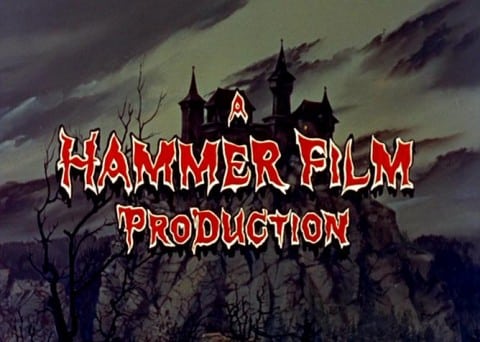
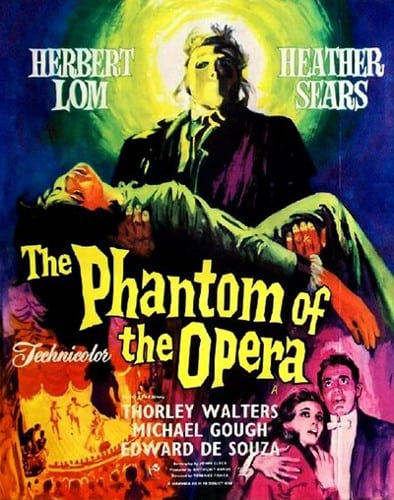
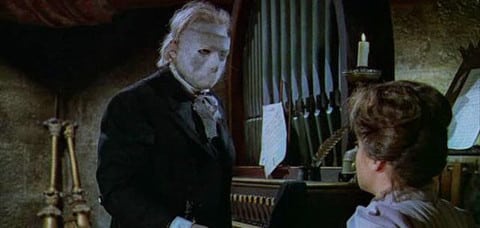
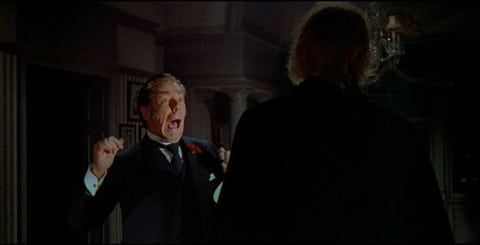




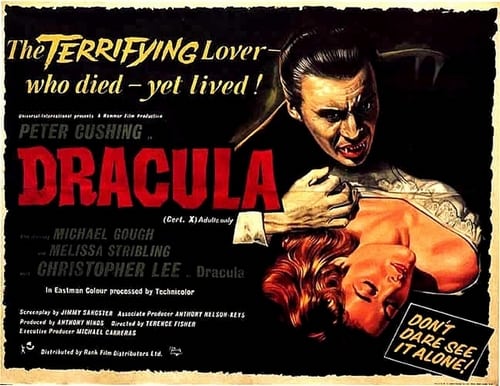
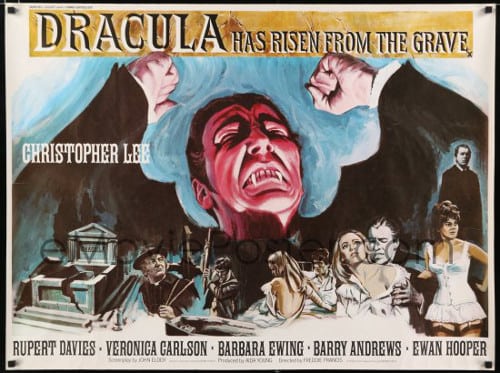
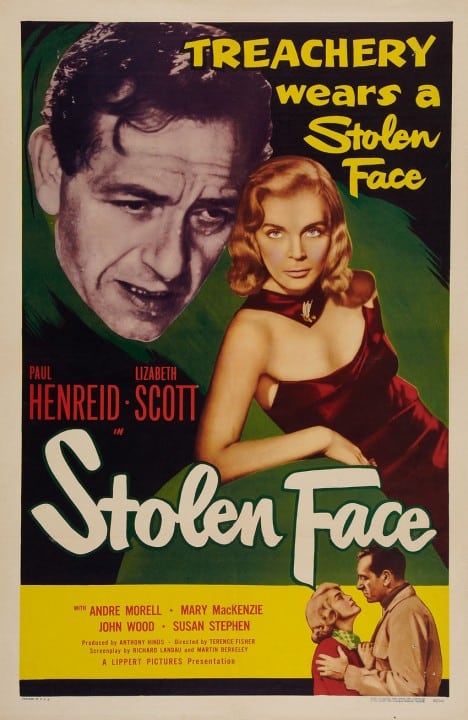
Be the first to comment